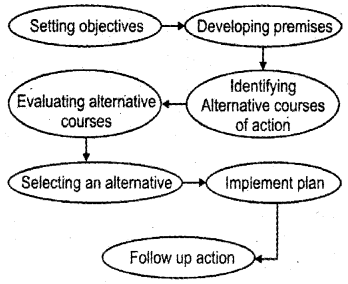Kerala Plus Two Business Studies Notes Chapter 4 Planning
Planning – Meaning
Planning is deciding in advance what to do and how to do. It is one of the basic managerial functions. Planning is closely connected with creativity and innovation. Planning involves setting objectives and developing appropriate courses of action to achieve these objectives.
Importance of Planning
- Planning provides directions: By stating in advance how work is to be done planning provides direction for all actions.
- Planning reduces the risk of uncertainty: Planning enables an organisation to predict future events and prepare to face unexpected events.
- Planning reduces wasteful activities: Planning serves as the basis of co-ordinating the activities and efforts of different departments and individuals. It helps to eliminate useless and redundant activities.
- Planning promotes innovative ideas: Since planning is thinking in advance, there is scope for finding better and different methods to achieve the desired objectives.
- Planning facilitates decision making: Planning helps in decision making by selecting the best alternative among the various alternatives.
- Facilitates control: Planning provides the basis for control. Planning specifies the standard with which the actual performance is compared to find out deviation and taking corrective action.
Features of Planning
- Planning is goal oriented
- It is the primary function of management
- It is required at all levels of management
- Planning is a continuous process
- Planning is futuristic (forward looking)
- It is a decision making function
- It is a mental process
Limitations of Planning
- Planning makes the activities rigid.
- Long term plans are insignificant in the rapidly changing business environment.
- It reduces creativity.
- It involves cost.
- It involves a lot of time.
- Planning does not guarantee success.
Planning Process (Steps in Planning)
1) Setting Objectives: The first step in planning is setting objectives. Objectives may be set for the entire organisation and for each department. The objective must be specific and clear.
2) Developing premises: Planning is based on certain assumptions about the future. These assumptions are called planning premises. Forecasting is important in developing planning premises.
3) Identifying alternative courses of action: The next step in planning is to identify the alternative courses of action to achieve the objectives.
4) Evaluating alternative Courses: The pros and cons of various alternatives must be evaluated in terms of their expected cost and benefits.
5) Selecting an alternative: After evaluating the alternatives the manager will select that alternative which gives maximum benefit at minimum cost.
6) Implement the plan: Implementation of plan means putting plans, into action so as to achieve the objectives of the business.
7) Follow up action: Plans are to be evaluated regularly to check whether they are being implemented and activities are performed according to schedule.

Types of Plans
1) Single use plan: A single use plan is developed for a one-time event or project. Such plans are not to be repeated in future. E.g. budgets, programmes, projects, etc.
2) Standing plan: A standing plan is used for activities that occur regularly over a period of time. E .g. policies, procedures, methods and rules.
Plans can be classified as Objectives, Strategy, Policy, Procedure, Method, Rule, Programme and Budget.
- Objectives: Objectives are the ends, towards which activity is aimed at for the accomplishment of organizational goals. Objective should be measurable in quantitative terms.
- Strategy: Strategy is a comprehensive plan for accomplishing an organization objectives. This comprehensive plan will include determining long term objectives, adopting a particular course of action and allocating resources.
- Policy: Policy is a broad statement formulated to provide guidelines in decision making.
- Procedure: Procedure is a chronological sequence or steps to be undertaken to enforce a policy.
- Method: Methods provide detailed and specific guidance for day-to-day action.
- Rule: Rules are prescribed guidelines for conducting an action.
- Programme: Programme includes all the activities necessary for achieving a given objective Programmes are the combination of goals, policies, procedures and rules.
- Budget: A budget is a statement of expected results expressed in numerical terms.
